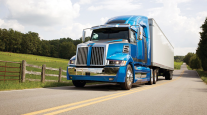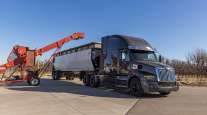Senior Reporter
February Class 8 Sales Flat at 15,369

[Stay on top of transportation news: Get TTNews in your inbox.]
U.S. Class 8 retail sales in February were 0.6% lower compared with a year earlier, coming in at 15,369, WardsAuto.com reported. Experts said supply chain constraints persisted, creating a production logjam.
A year ago Class 8 sales were 15,460, according to Wards.
Year-to-date sales rose 3.6% to 32,213 compared with year-ago combined sales in January and February of 31,105.

Volvo Trucks North America posted a leading 21.2% increase with sales of 1,607. (Volvo Trucks North America)
“The overall market for retail sales was as expected in February and it’s clear all OEMs are having the same issues with supply chain constraints, which are affecting sales figures,” Magnus Koeck, vice president of strategy at Volvo Trucks North America, told Transport Topics.
“The main uncertainty this year will continue to be the unbalance between demand and supply and when the supply chain will pick up the pace,” Koeck added.
Only two truck makers notched sales gains in February compared with the 2020 period. All others had modest declines in terms of number of units sold.
VTNA, a unit of Volvo Group, posted a leading 21.2% increase with sales of 1,607 compared with 1,326 a year earlier. That earned it a 10.5% market share for the month.
Market leader Freightliner posted a 6.9% gain on sales of 6,247 compared with 5,844 in the 2020 period. That was good for a 40.6% share.
Freightliner is a unit of Daimler Trucks North America.
“The February sales number was very disappointing because fleets need trucks now and there are not enough trucks available, but the orders keep piling up in a logjam,” said Don Ake, vice president of commercial vehicles at FTR.
Ake suggested the backlog-to-build ratio “will probably hit a record with the February data.”
In January, the ratio stood at 9.6 months, he said. It factors in how long will it take to build all the orders in the backlog based on current production rates.
ACT Research forecast Class 8 U.S. retail sales will reach 249,000 this year. In 2020, U.S. Class 8 retail sales hit 191,900.
“The whole underlying fundamentals for demand and truckers’ profitability suggest higher numbers than that,” said Steve Tam, vice president of ACT. “But then there are those supply chain challenges. We saw a pretty good step down in production in the January time frame so I think that is the beginning of the delays that we will probably experience, and those [will be] largely blamed on the supply chain.”
In the meantime, Mack Trucks, also a Volvo Group brand, posted a 7.6% decline on sales of 1,182 compared with 1,279 a year earlier and earned a 7.7% share.
“Class 8 retails in February remained steady as the global economy continued to work toward recovery from the pandemic,” said Jonathan Randall, senior vice president of North American sales at Mack. “Consumer spending continues to drive most of the economic growth and freight demand, along with inventory restocking and residential construction spending. At Mack, customer demand was across all Class 8 segments.”
Preston Feight, CEO of Paccar Inc., noted in the company’s latest earnings call the industry is “kind of doing pretty well. And I don’t expect that to change. Truck utilization is high. And so I think that we are even starting to see signs of green shoots in the oil and gas industry. All of that combined points to a good year for us in the U.S. and Canada.”
Paccar is the parent of Kenworth Truck Co. and Peterbilt Motors Co.
The demand story for commercial vehicles remains unchanged this year, but the supply chain’s ability to respond to demand will be the key determinant of Class 8 and van trailer production in 2021. https://t.co/GFVmzKIPYG #HeavyDuty, #MediumDuty #trailers #transportation #trucking pic.twitter.com/kQWttIEqUP
— ACT Research (@actresearch) March 11, 2021
Peterbilt sales slipped 3.3% to 2,335 compared with 2,415 and earned a 15.2% share, the second highest in the month.
Kenworth saw sales drop 12% to 2,132 compared with 2,424 in the 2020 period, good for a 13.9% share.
At International, a brand of Navistar Inc., sales dropped 11.3% to 1,519 compared with 1,713 and it earned a 9.9% share.
“We expect the rollout of COVID-19 vaccines and easing of state restrictions will continue to support strong economic growth and the need for new trucks,” said Persio Lisboa, CEO of Navistar International Corp., in the holding company’s latest earnings call.
Western Star, also a DTNA brand, saw sales fall 24.4% to 347 from 459 a year earlier. It notched a 2.3% share.
Meanwhile, in addition to not having enough trucks and wanting more, fleets are vying heavily to add drivers as they see freight growth extending beyond this year.
Tam said he has seen a few hiring announcements from big companies including Walmart (with an $8,000 sign-on bonus about a month ago), Yellow and Old Dominion Freight Line. “They’ll be able to do that, but it is just going to cost them more.”
Looking further ahead, American Trucking Associations noted the trucking industry will need to hire roughly 1.1 million new drivers, or an average of nearly 110,000 per year, to keep up with demand.
Want more news? Listen to today's daily briefing below or go here for more info:




